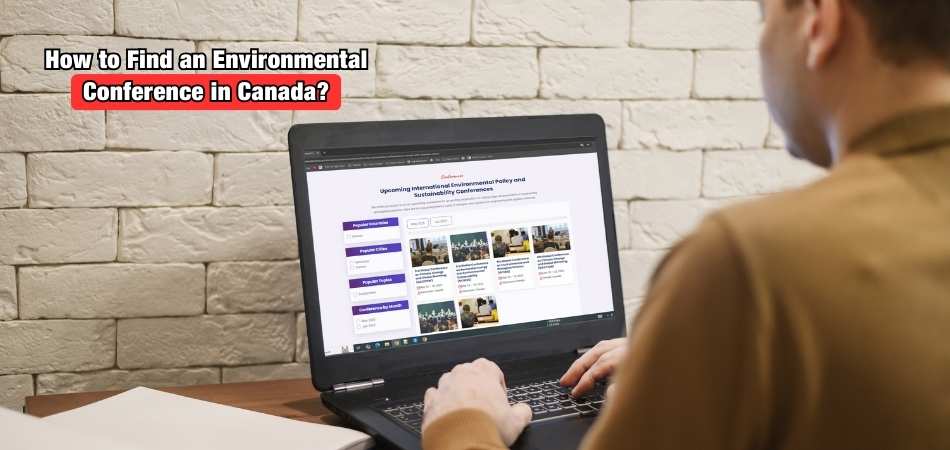In an era where environmental issues are taking center stage, staying informed and engaged with the latest developments is more important than ever. Conferences provide an excellent platform to network, learn, and contribute to critical conversations about sustainability and environmental innovation. But the question remains: How to find an environmental conference in Canada?
To find an environmental conference in Canada, explore the university’s event pages, professional networks, and event organizers’ platforms like Global Conference Alliance Inc., Social media and local environmental organizations also share upcoming events. Use these tools to discover conferences that match your interests and goals.
Are you curious about how to locate the right conference for your interests? This article provides all the essential tips and resources to help you find, join, and benefit from Canadian environmental conferences. Keep reading to discover more!
Why Should You Attend an Environmental Conference in Canada?
Attending an environmental conference is a great way to stay informed and inspired about sustainability efforts. These events bring together experts, activists, and innovators to discuss pressing environmental issues and explore solutions. They offer a platform to share ideas, network, and learn from leading voices in the field.
Canada hosts numerous conferences addressing critical topics such as climate change, conservation, and green technology. These events highlight the country’s commitment to sustainability and provide attendees with insights into impactful initiatives. By participating, you gain practical knowledge and contribute to global environmental efforts.
According to recent data, Canada organizes over 100 environmental conferences annually, with increasing participation from global stakeholders. Attending an environmental conference in Canada is a great opportunity to engage with experts and explore innovative strategies for tackling environmental challenges effectively. Get involved in these transformative events while you can!
How to Find an Environmental Conference in Canada?
You can easily find an environmental conference in Canada with the right approach, but it can seem challenging at first. Whether you’re a student, professional, or activist, there are many ways to discover these valuable events. Below are some effective strategies to help you locate the right conference.
Explore University and Research Institution Websites
Canadian universities and research institutions frequently host or partner with environmental conferences. These institutions often have dedicated event pages or environmental departments that list upcoming conferences. Various universities are known for hosting significant sustainability events. Regularly checking their websites keeps you informed about academic conferences and workshops.
Check Conference Organizer Websites
Conference organizer websites like Global Conference Alliance Inc. specialize in listing conferences across various fields, including the environment. You can filter searches by location, date, and topic to find conferences specific to Canada. These platforms also allow you to subscribe to updates, so you’ll never miss an announcement. Their user-friendly interfaces make it easy to explore diverse options.
Use Professional Networks and Associations
Professional organizations and associations in environmental sciences, such as the Canadian Environmental Network (RCEN) or the Environmental Studies Association of Canada (ESAC), often organize conferences. They also promote industry-specific events. Engaging with these groups through memberships or online communities helps you stay updated on upcoming gatherings. Networking within these circles can lead to recommendations and invitations.
Check Social Media Platforms and Event Pages
Social media is a powerful tool for discovering events. Platforms like LinkedIn, Facebook, and Twitter frequently promote environmental conferences, particularly through event pages and group discussions. Following Canadian environmental organizations and hashtags like #SustainabilityCanada or #EcoConferenceCanada helps you stay in the loop. Social media also allows you to interact with organizers for more details.
Visit Environmental Organization Websites
Canadian environmental organizations often host or participate in conferences. Their websites provide details about events they’re supporting or organizing. These organizations focus on a range of topics, such as conservation, renewable energy, and climate action, ensuring that you find a conference suited to your interests.
Use Government and Municipal Resources
Government websites, particularly Environment Canada and provincial environmental departments, often list relevant conferences and seminars. These resources highlight events that align with national and regional sustainability goals. Municipal websites may also promote smaller, local conferences that address community-specific environmental issues.
Attend Industry Exhibitions and Trade Shows
Many environmental conferences are held alongside trade shows and exhibitions focused on green technology and innovation. Many events frequently feature conference sessions. These events are an excellent way to discover cutting-edge solutions while networking with professionals and organizations.
Sign Up for Newsletters and Email Alerts
Subscribing to newsletters from environmental organizations, universities, or professional associations is a proactive way to receive updates. Many of these entities send regular alerts about upcoming conferences, webinars, and workshops. Email alerts keep you informed without the need for constant searches.
Finding an environmental conference in Canada is all about using the right tools and networks. With these strategies, you can easily discover events that match your interests and help you contribute to sustainability initiatives. Start exploring today and be part of impactful conversations shaping Canada’s environmental future!
Key Benefits of Attending an Environmental Conference in Canada
An environmental conference in Canada offers professional, educational, and personal growth opportunities. These events bring together experts, activists, and enthusiasts to address pressing environmental challenges and solutions. Here are the key benefits of participating in such conferences.
Gain In-Depth Knowledge
Environmental conferences provide access to the latest research, trends, and innovations in sustainability. Renowned experts and researchers share insights on topics like climate change, conservation, renewable energy, and more. Attendees gain actionable knowledge to apply in their personal or professional endeavors. This deeper perspective empowers you to contribute effectively to environmental efforts.
Build Valuable Networks
These conferences create a great platform to connect with like-minded professionals, policymakers, and industry leaders. Networking opportunities during sessions, workshops, and social events allow you to share ideas and establish partnerships. Building strong connections can open doors to collaborations, internships, or job opportunities. A robust network is crucial for long-term success in the environmental field.
Explore Practical Solutions
Many environmental conferences in Canada focus on showcasing innovative solutions and technologies. Participants can explore practical approaches to pressing environmental issues through panel discussions, exhibitions, and case studies. By engaging with these solutions, attendees gain tools and inspiration to address challenges in their communities or organizations.
Stay Updated on Policy and Advocacy
Canada plays a significant role in shaping global environmental policies. Conferences often feature discussions on current regulations, international agreements, and advocacy efforts. Attending these sessions keeps you informed about the latest policy changes and how they impact various sectors. This knowledge ensures you remain compliant and proactive in your sustainability efforts.
Increase Personal and Professional Credibility
Presenting at or actively participating in a conference demonstrates your commitment to environmental sustainability. It establishes your credibility as a knowledgeable and engaged individual in your field. These experiences also help you build a reputation as a thought leader, enhancing your personal and professional profile.
Experience Diverse Perspectives
Environmental conferences bring together people from diverse backgrounds, industries, and disciplines. Engaging with these perspectives broadens your knowledge of global environmental issues. This diversity promotes creative thinking and encourages interdisciplinary solutions, enriching your ability to tackle challenges.
Contribute to Meaningful Change
By attending an environmental conference, you actively support initiatives driving positive environmental impact. Your participation not only helps you grow but also contributes to the larger movement for sustainability. Sharing your insights and taking actionable steps based on what you learn can create ripple effects in your community and beyond.
Who Can Participate in Environmental Conferences in Canada?
Environmental conferences in Canada welcome a diverse range of participants. These events are designed to encourage collaboration, learning, and innovation across various fields and interests. Professionals, students, and activists often join Canadian environmental conferences to share knowledge, network, and contribute to meaningful change. Here’s a closer look at who can attend and benefit from these gatherings.
Students and Young Professionals
Students and young professionals are key participants in environmental conferences. These events provide an excellent platform for learning about advanced research and networking with industry leaders. Attendees can gain inspiration, mentorship, and insights into career opportunities in sustainability. Young professionals also have the chance to showcase their work through poster presentations or discussions, building their credibility in the field.
Academics and Researchers
Academics and researchers play a vital role in environmental conferences by presenting their findings and exploring collaborations. These events offer a platform to share groundbreaking studies and gain feedback from peers. Researchers can stay updated on the latest trends and methodologies in their area of expertise. Conferences also provide opportunities to connect with funders and institutions that support environmental research.
Industry Professionals
Industry professionals, including engineers, architects, and environmental consultants, frequently attend these conferences. They participate to explore practical solutions and innovations that can be applied in their work. By engaging in discussions and workshops, professionals gain insights into sustainable practices and technologies. Networking with other experts helps them stay competitive and informed about industry trends.
Policymakers and Government Officials
Policymakers and government officials are crucial participants in environmental conferences as they shape regulations and policies. These events offer a space to discuss challenges and opportunities in implementing sustainable solutions. Government representatives can interact with experts and stakeholders to gather input for more effective policies. Their presence ensures that policy development is informed by science and community needs.
Environmental Activists and Nonprofit Organizations
Environmental activists and nonprofit organizations attend to advocate for change and share their initiatives. These conferences allow them to connect with like-minded individuals and amplify their message. Nonprofits often showcase their projects and seek collaborations or funding. Activists use these platforms to stay updated on environmental issues and strategies for driving impactful action.
Entrepreneurs and Innovators
Entrepreneurs and innovators in the sustainability space often participate to showcase their products and ideas. These conferences serve as a launchpad for eco-friendly startups and green technologies. Entrepreneurs can connect with potential investors, partners, and customers. Attending such events also helps them understand market trends and consumer expectations.
Educators and Community Leaders
Educators and community leaders play an important role by connecting knowledge and local action. They attend conferences to gather resources, tools, and strategies for community engagement. Educators can incorporate new ideas into their teaching, while community leaders can drive local sustainability initiatives. Their participation ensures that conference insights are applied at the grassroots level.
How to Choose the Right Environmental Conference for You?
Your time and efforts will be most effectively spent if you select the right environmental conference. With so many options available, focusing on key factors can help you make the best choice. Here are practical tips to guide your decision.
Identify Your Goals
Start by defining what you want to achieve from attending a conference. Are you looking to network, gain knowledge, or present your work? Knowing about your objectives will help you focus on events that align with your needs. A clear purpose ensures your participation is productive and rewarding. Having clear goals also helps you evaluate whether the conference’s outcomes align with your personal or professional aspirations.
Consider the Conference Topics
Examine the themes and topics covered in the conference program. Look for events that focus on areas you’re passionate about or professionally involved in, such as climate change, renewable energy, or biodiversity. A well-aligned conference will provide you with deeper insights and relevant discussions. Choose a conference with diverse subtopics to ensure a comprehensive learning experience.
Research the Speakers and Participants
Check the list of keynote speakers, panelists, and attendees. Conferences featuring renowned experts or organizations in your field are likely to offer high-quality content. Additionally, knowing the type of audience can help you determine if the conference provides the networking opportunities you seek. This research helps you prioritize events where you can connect with influential individuals in your area of interest.
Assess the Location and Format
Decide whether you prefer attending in person or virtually. Physical events offer face-to-face networking, while virtual conferences provide flexibility and accessibility. Consider the location, travel costs, and time commitment if you’re attending on-site. Reflect on the format that best fits your learning style and ensures maximum engagement.
Review the Agenda and Schedule
Analyze the agenda to ensure it includes sessions, workshops, or topics of interest to you. A well-structured program with interactive elements like Q&A sessions or panel discussions adds value. Make sure the schedule accommodates your availability and allows you to participate fully. A balanced agenda ensures you get a mix of learning, networking, and interactive opportunities.
Check for Additional Opportunities
Many conferences offer perks like certifications, access to exclusive materials, or opportunities to showcase your work. Look for events that provide added benefits aligning with your professional growth. These extras can enrich the overall value of your attendance. Consider conferences that include mentorship opportunities or networking lounges for more personalized engagement.
Consider the Cost and Budget
Review the registration fees and potential travel expenses to ensure the conference fits your budget. Some conferences offer early-bird discounts, student rates, or scholarships. Finding a cost-effective option that meets your needs allows you to participate without financial strain. Explore sponsorship opportunities or employer reimbursement options to further offset costs.
How to Prepare for an Environmental Conference in Canada?
Proper preparation for an environmental conference ensures you make the most of the event. From organizing your schedule to planning your interactions, being prepared helps you stay focused and confident. Here are key steps to get ready for your next conference.
Research the Conference Details
Begin by learning about the scope, themes, and schedule of the event. Visit the official website to explore the agenda, speakers, and session topics. Knowing the conference’s focus allows you to personalize your preparation to align with your interests and objectives. Additionally, stay updated on environmental conference availability in Canada to ensure you don’t miss any significant opportunities.
Organize Your Materials
Prepare all the materials you’ll need, such as business cards, notebooks, or devices for taking notes. If you’re presenting, ensure your slides or posters are finalized, visually appealing, and aligned with the conference guidelines. Practicing your presentation in advance helps you deliver confidently. Having well-prepared materials shows professionalism and enhances your overall experience.
Plan Your Networking Strategy
Identify key participants, speakers, or organizations you’d like to connect with. Review the attendee list or conference app, if available, to learn about their work. Prepare a short introduction or pitch to communicate your interests effectively. Setting networking goals ensures you make meaningful connections during the event.
Familiarize Yourself with the Venue and Logistics
If the conference is in person, review the venue map and logistics like transportation and accommodations. Arriving early allows you to explore the setup and locate important areas like session rooms, networking zones, and exhibits. For virtual events, ensure you have a stable internet connection and test the platform in advance. Being logistically prepared eliminates unnecessary stress.
Set Clear Goals
Define what you hope to achieve at the conference, whether it’s gaining knowledge, building connections, or exploring new opportunities. Setting specific goals allows you to prioritize sessions and activities that align with your objectives. Reflecting on these goals afterwards helps measure the success of your participation.
Engage Actively During the Event
Be present and proactive during the conference by participating in discussions, asking questions, and attending interactive workshops. Take notes to capture key takeaways and insights. Active engagement helps you absorb valuable information and make a positive impression on fellow participants.
Prepare for Follow-Up
After the event, plan to follow up with new contacts or connections you made. Send personalized emails or messages thanking them for their time and insights. Reflect on the knowledge gained and consider how to apply it to your work or projects. Effective follow-up ensures the conference has a lasting impact on your personal and professional growth.
Tips to Make the Most of Your Canadian Conference Experience
Attending a Canadian conference is an exciting opportunity to learn, network, and grow. With proper planning and engagement, you can maximize the benefits of your participation. Here are some practical tips to improve your conference experience.
- Plan Your Agenda in Advance: Review the conference schedule and select sessions that align with your interests and goals. Prioritizing events ensures you don’t miss key discussions or networking opportunities.
- Engage Actively in Sessions: Take notes and ask thoughtful questions during presentations and panels. This not only improves your learning but also helps you connect with speakers and participants.
- Network Strategically: Introduce yourself to attendees and exchange contact information with those who share your interests. Follow up after the conference to strengthen the connections you’ve made.
- Take Advantage of Workshops: Attend interactive workshops to gain hands-on experience and practical knowledge. These smaller, focused sessions often provide deeper insights into specific topics.
- Explore the Venue and Exhibits: Visit exhibitor booths and resource centers to learn about innovative products or services. Engaging with exhibitors can lead to valuable opportunities and ideas.
- Stay Open to New Ideas: Be willing to explore topics outside your primary area of focus. Broadening your perspective can inspire innovative approaches in your field.
- Use Social Media to Connect: Share your experiences and insights on social media platforms during the event. Tagging the conference and engaging with hashtags can expand your network online.
- Balance Participation with Breaks: Conferences can be intense, so take short breaks to recharge. Use downtime to reflect on what you’ve learned and prepare for upcoming sessions.
- Follow-Up After the Conference: Reach out to new contacts with personalized messages, thanking them for their time. Share your key takeaways with your team or community to extend the impact of your experience.
FAQs
Finding an environmental conference in Canada can be a transformative experience, offering opportunities to learn, network, and grow. Here are some frequently asked questions to guide you in locating these impactful events and making the most of your participation.
What Are the Best Platforms for Finding Niche Environmental Conferences?
Specialized platforms (Global Conference Alliance Inc., Eventbrite) often list niche environmental conferences in Canada. These platforms allow users to filter by region, theme, and interests. Subscribing to updates ensures you stay informed about upcoming events fitted to your specific environmental focus.
Can Local Environmental Groups Help Identify Conferences?
Local environmental organizations often organize or promote events in Canada. Connecting with groups like local conservation societies or eco-friendly community initiatives helps you discover smaller, impactful conferences that might not be widely advertised but align closely with grassroots sustainability efforts.
How Can Academic Journals Help in Finding Conferences?
Academic journals in environmental science frequently advertise relevant conferences as part of their community outreach. These listings often include conferences aligned with specific research themes, providing researchers and students access to academic gatherings with a strong focus on advancing environmental knowledge.
How Can Personal Referrals Help in Finding Conferences?
Networking with colleagues, professors, or industry contacts is an effective way to learn about environmental conferences in Canada. Personal referrals often provide insights into lesser-known but high-value events and offer a direct connection to organizers or participants for deeper engagement.
Final Thought
Canadian environmental conferences are powerful platforms for discussing global challenges and exploring sustainable solutions. They bring together experts, advocates, and innovators to inspire meaningful change. Participating in these events can open doors to collaboration, fresh perspectives, and actionable ideas for a greener future.
If you’re wondering how to find an environmental conference in Canada, the process is simple. Use platforms like university event pages, professional networks, and conference aggregator websites. Social media and environmental organizations also regularly share updates. These tools can guide you to the perfect event suited to your interests.
To make the most of your experience, prepare by researching the agenda, connecting with participants, and engaging actively during sessions. Remember to follow up with new contacts and apply what you’ve learned. Wishing you success as you explore and contribute to environmental progress!









